 MyDogBreeds
MyDogBreeds Shepherd Husky is originated from United States but Pomeranian is originated from Germany. Shepherd Husky may grow 36 cm / 15 inches higher than Pomeranian. Shepherd Husky may weigh 36 kg / 80 pounds more than Pomeranian. Both Shepherd Husky and Pomeranian has almost same life span. Shepherd Husky may have more litter size than Pomeranian. Both Shepherd Husky and Pomeranian requires Moderate maintenance.
Shepherd Husky is originated from United States but Pomeranian is originated from Germany. Shepherd Husky may grow 36 cm / 15 inches higher than Pomeranian. Shepherd Husky may weigh 36 kg / 80 pounds more than Pomeranian. Both Shepherd Husky and Pomeranian has almost same life span. Shepherd Husky may have more litter size than Pomeranian. Both Shepherd Husky and Pomeranian requires Moderate maintenance.
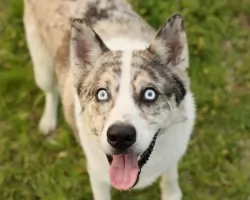 What a beautiful dog the Shepherd Husky is. He is a mix between the Husky and the German Shepherd. Other names for him include Gerberian Shepsky, German Husky and Siberian Shepherd.
What a beautiful dog the Shepherd Husky is. He is a mix between the Husky and the German Shepherd. Other names for him include Gerberian Shepsky, German Husky and Siberian Shepherd.
The German Shepherd originated in Germany and the Husky is from Siberia. We assume this mixed breed dog was bred in the USA. The true origin of the German Shepherd Husky dog is unclear but both the parent breeds have long histories.
The dog is recognized as a Hybrid by both the Dog Registry of America as well as the American canine hybrid Club.
 Pomeranian dog Known as the Pom and classified as a toy dog breed, the Pomeranian comes from the Spitz dog from the Arctic regions. It is thought that the dog is descended from larger Spitz-type dogs, and more specifically the German Spitz.
Pomeranian dog Known as the Pom and classified as a toy dog breed, the Pomeranian comes from the Spitz dog from the Arctic regions. It is thought that the dog is descended from larger Spitz-type dogs, and more specifically the German Spitz.
It appears to be an ancient dog breed because there are recordings of its existence from 1764 already. This little dog is thought to have got his name from the area known as Pomeranian in Northern Poland as well as along the Baltic Sea, Germany.
The first breed club for this dog was established in England in 1891. Not long afterwards the first breed standard was written. In the standard published in 1998, The Pomeranian Dog is categorized in the German Spitz standard.
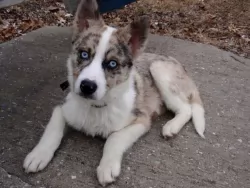 Solid and strong, the German Shepherd Husky mix is attractive. He is a fairly large dog standing at 51 to 64cm in height and weighing between 20 to 40kg.
Solid and strong, the German Shepherd Husky mix is attractive. He is a fairly large dog standing at 51 to 64cm in height and weighing between 20 to 40kg.
They’re powerful dogs these as they have a long history of being working dogs. The eyes of this beautiful dog can be brown, green or blue or a mix of these. The thick double coat protects them from the cold and in the warmer months, he sheds quite a bit.
The coat can be brown, black and tan or it can have creamy shades and be mixed with grey and white too.
The Shepherd Husky is a friendly, amicable dog who wants to please his owner. Training and socialization make him even more well adjusted. He is a dog that will get on well with children in the home as well as other dogs.
He is such an all rounder this dog – loyal, intelligent, social and loving - being great for accompanying you on walks and hikes but being willing to sit with you indoors too.
While he is adaptable and good natured and will happily live with his owner in the city or the countryside, he is better suited to life in the countryside. He also makes a great guard-dog.
 This is such a sweet little dog, full of good cheer and with such a bright little face. He weighs between 1.5kg and 4kg and stands at anything between 17 and 28cm in height.
This is such a sweet little dog, full of good cheer and with such a bright little face. He weighs between 1.5kg and 4kg and stands at anything between 17 and 28cm in height.
He is such a compact little fluff ball with sharp erect ears and a fox like appearance with a well feathered tail that curls up over the dog’s back.
The coat is thick and spritely, not lying flat but standing up around the dog. Coats can be nearly any color, but the most common is tan, reddish, orange or you get a mix of cream tan and black.
When you look into the bright little face of the Pomeranian Puppy, you can see that he is a true extrovert. He is social and has a huge personality. They’re bright, eager, feisty, loving and loyal.
Full of fun and very intelligent, they may be small and cute, but training and socialization will do him the world of good as it means you can take him anywhere with you and he’ll be well behaved. They grow attached to their owners and want to protect them.
They can be somewhat aloof with strangers and its this wariness around them that makes them good watchdogs. They get on well with children in the home and are prepared to make friends with other pets in the family too.
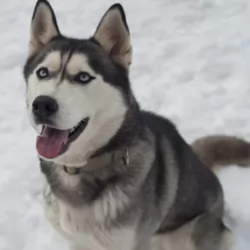 The German Shepherd Husky mix is such an ideal dog for single people, couples and families. This wolf-like breed is intelligent, loving,social and protective – the ideal family dog.
The German Shepherd Husky mix is such an ideal dog for single people, couples and families. This wolf-like breed is intelligent, loving,social and protective – the ideal family dog.
For those looking for an active dog that can be their jogging, walking and camping partner, this dog is for you. He loves to be busy, but he also loves being made a fuss of indoors too.
He has so many excellent qualities and is one dog breed that ticks all the right boxes for being such an all-round splendid pet and companion.
 Pomeranians are such bright, friendly little dogs and they’re also active. These loving dogs are also intelligent so you can easily teach him some simple commands such as sit or lie down.
Pomeranians are such bright, friendly little dogs and they’re also active. These loving dogs are also intelligent so you can easily teach him some simple commands such as sit or lie down.
He won’t want to lie down for too long though because he’s full of beans.
He’s alert too so he makes a good watchdog. When you bring one of these dogs into your home as a pet and companion animal, you won’t be disappointed as he’s got a whole lot of love to give.
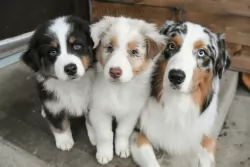 This is such a robust dog that you an scarcely think of him being sickly and yet there are some illnesses that are common to all dogs and which your German Shepherd Husky mix might get as well.
This is such a robust dog that you an scarcely think of him being sickly and yet there are some illnesses that are common to all dogs and which your German Shepherd Husky mix might get as well.
Hip dysplasia is common in German Shepherd dogs as well as arthritis and thyroid dysfunction. Bloat and cancer are other diseases to watch for.
Canine hip dysplasia is a genetic disease characterised as a disease of the hip. The malformation can lead to arthritis and pain and ultimately lead to the loss of hip function, crippling your dog.
You will need to get your pet to the vet for treatment to make his life more comfortable.
 Your little Pomeranian Puppy is a sturdy dog who isn’t going to battle too much with health issues. With good care such as good food and exercise, the Pomeranian can reach 12 – 16 years of age.
Your little Pomeranian Puppy is a sturdy dog who isn’t going to battle too much with health issues. With good care such as good food and exercise, the Pomeranian can reach 12 – 16 years of age.
Some of the most common health issues you might come across
This problem comes about when the ridges which form the patella groove in the knee aren’t deep enough to allow the patella to sit securely. This causes the patella to move out of the groove. While the muscles are contracted, the patella isn’t able to return to the correct position.
Pomeranians Dogs are prone to quite a few eye problems such as tear duct problems and cataracts. As a responsible dog owner, take your pet to the vet if you suspect eye problems.
The trachea carries air to the lungs and it can collapse. Your dog will have a chronic, dry cough and this can be brought about when people tug on their dog's leash.
Every little dog battles with teeth and gum problems which can lead to early tooth loss. When you brush your Pomeranian, make a point of checking inside his mouth too, as a bad tooth can cause pain but also all kinds of health problems.
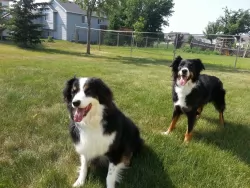 ◆Brush the coat of your Shepherd Husky twice a week to rid the coat of loose hairs. This dog’s hair sheds quite heavily as the weather warms and he may require brushing more often.
◆Brush the coat of your Shepherd Husky twice a week to rid the coat of loose hairs. This dog’s hair sheds quite heavily as the weather warms and he may require brushing more often.
◆When you brush him, check the ears and eyes for infection. The eyes must be bright and clear.
◆Feed your Shepherd Husky the best food there is as he is an energetic, working breed. The commercially manufactured foods can be a good, convenient choice but you need to make sure it is one of the better brands.
Some of the cheaper brands are full of bad ingredients that can make a dog sick.Try and give him some home-made foods that are healthy and nutritious. This food can be added to his dry kibble twice a week.
Boiled chicken, brown rice or pasta and spinach, sweet potatoes and carrots are a tasty healthy choice for your pet. Try and include some raw meat into the diet as well.
 Pomeranians Dogs have a thick, double coat, so you will need to invest in a decent brush so that you can brush him. He is a shedder so this is an important part of grooming. Some people prefer to take the dog to the groomers and have the coat professionally cut.
Pomeranians Dogs have a thick, double coat, so you will need to invest in a decent brush so that you can brush him. He is a shedder so this is an important part of grooming. Some people prefer to take the dog to the groomers and have the coat professionally cut.
Your cute little Pomeranian isn't the kind of dog to spend too much time asleep on the couch. He is energetic and full of beans and he will wait anxiously for you to take down his leash and take him on a walk. In indoors his bright little face will be watching yours to see if there’s any chance of a ball game.
People never know if they should feed their dogs dry kibble, semi-moist or canned dog food. Homemade food is always good, but if you opt to also use commercially manufactured dog food, go for the good quality ones that have vitamins and minerals in them.
Every dog needs a good balance of protein, carbs, minerals, fats, vitamins and trace elements. People often get all worked up over feeding their pets when it can be so simple.
Use a high quality dry kibble, but now and then add some home-made cooked food into it as a treat – about once or twice a week. Boil some chicken, brown rice, sweet potato, carrots and spinach and add this in to the dry kibble.
Every now and then a little bit of raw meat will also do your pet the world of good. What could be more simple than this? Nutritious, tasty and healthy, and your pet will thrive on it.
Make sure he always has a bowl of fresh, cool water close by.